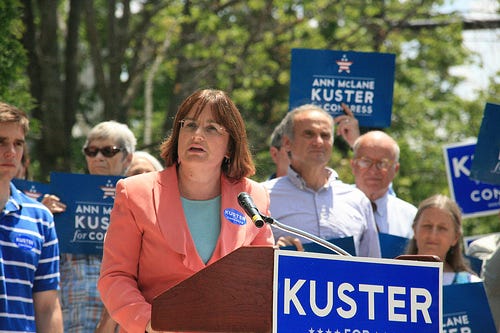Kuster statement opposing Dodd-Frank roll-back at odds with congressional voting record

Congresswoman Ann Kuster’s assertion that she opposed a provision in the 2014 spending bill that weakened banking regulations is at odds with her congressional voting record.
In December, the outgoing Congress passed a $1 trillion spending package that funds most of the federal government through the current fiscal year. The so-called “CRomnibus” legislation included controversial language rolling back a provision in the Dodd-Frank banking regulations that prohibited FDIC-insured banks from engaging in risky swaps and derivatives trading.
Kuster told the Concord Monitor she opposed the Dodd-Frank provision (and another measure raising the limit on contributions to political parties) but voted for the spending bill to avoid a government shutdown. “ ’As standalone bills, I would be opposed’ to those measures, [Kuster] said, but she felt it was ‘a better deal than if we’d closed down the government and come back in January when the Republicans controlled the Senate.’ “
Salon’s David Dayen tracked the legislative history of the Dodd-Frank "push-out” repeal contained in the CRomnibus bill and noted the language is “virtually identical” to HR 992, the “Swaps Regulatory Improvement Act,” which Kuster supported:
The origins of eliminating Section 716 go back to the writing of Dodd-Frank itself. Blanche Lincoln, author of the derivatives regulations in the bill, initially included practically all swaps. A combination of lobbyists, Wall Street-friendly “New Democrats” and the Treasury Department significantly rolled that back, limiting it to the riskiest bits, like credit default swaps that don’t go through a clearinghouse.
After wounding the provision, the banks employed their allies in Congress to disappear it entirely. A bipartisan coalition, including Jim Himes, D-Conn., a former vice president at Goldman Sachs, introduced a host of bills to weaken derivatives rules as far back as 2011. HR 992, the “Swaps Regulatory Improvement Act,” sailed through the House Financial Services Committee 53-6 in spring 2013. The language of this bill, written by Citigroup lobbyists, is virtually identical to what passed in the CRomnibus.
As we reported in 2013, Kuster was one of six Democrats on the House Agriculture Committee who voted with the Republican majority in favor of HR 992. When the bill advanced to the House floor, Kuster once again voted in favor of the legislation, which was approved by the House in a 292-122 vote before dying in the Senate.
The New York Times reported Citigroup lobbyists drafted the language in HR 992. It’s worth noting that Kuster, who is a prodigious fundraiser, has received $8,000 in campaign contributions from the Citigroup PAC. This cycle, she raised over $90,000 in PAC money from the financial industry including contributions from Bank of America, Goldman Sachs, JPMorgan Chase, Morgan Stanley, TD Bank USA and UBS Americas.
Kuster’s communications director did not respond to our email seeking clarification.
h/t: Dean Barker


